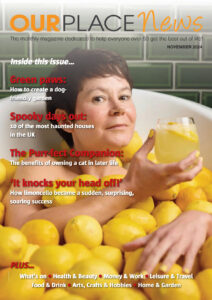Embracing the ageing process can be a positive experience if you choose to see it that way.
 Do you flinch when you blow out the candles on your birthday cake? Or surreptitiously keep the date hidden from your friends and colleagues? You may have a touch of ‘gerascophobia’ – and no, it’s not a tropical disease, nor are you likely to pick it up on a Tinder date; gerascophobia is actually the fear of getting old.
Do you flinch when you blow out the candles on your birthday cake? Or surreptitiously keep the date hidden from your friends and colleagues? You may have a touch of ‘gerascophobia’ – and no, it’s not a tropical disease, nor are you likely to pick it up on a Tinder date; gerascophobia is actually the fear of getting old.
Stereotypes tell us that ageing is not something to look forward to. It leaves us depressed, lonely, dependent, comically incapable of using smartphones, and prone to boring everyone around the dinner table with outdated stories. The cosmetics industry further instils dread, with constant reminders that ageing is something that should be secretly battled with expensive products and regimes.
”There are plenty of reasons to fear ageing,” says Thomas Moore, who lived as a Catholic monk for 12 years before leaving to become a psychotherapist. “(There’s the) fear of losing health and physical ability, but also the sense of mortality that is all part of the process.”
Moore has long studied the emotional effects of ageing, and now offers a fresh and uplifting vision on the fear of growing old in his new book, Ageless Soul. According to him, as we grow older, we may gain more imperfections, but we become more enriched and complex individuals.
Complaining about age is the first pitfall
We’ve all had those days where we’ve been hit with disbelief at the date on the calendar, wondering how it could be a decade since our favourite film was released, or several more since a major life event – but dwelling on a ‘dreaded’ number will simply throw you into a spiral of negativity. “If you fight (getting older) and complain about its downside, you may be miserable for the rest of your life, because ageing is the one thing that doesn’t get better,” says Thomas. If you can see the wrinkles forming in the mirror and be at peace with it now, then you’ll be equally calm about it in five years’ time. “Keep working against ageing, and before long you will have lost the battle,” says Moore. “The secret to ageing is to face the loss of youthful beauty and strength, and from there use all of the resources we have to be creative, positive and optimistic.”
Ageing is a verb
If you thought growing old didn’t require effort, you’re wrong. According to Thomas, ageing is a skill you need to cultivate, and fighting against time prohibits you from learning it properly. “Ageing is an activity,” he says. “It is something that you do, not something that happens. When you age – active verb – you are proactive. If you really age, you become a better person. We tend to see time as a line that inevitably moves along monotonously, like a conveyor belt in a factory. But life isn’t so mechanical.”
Ageing gives us a better vantage point
“I don’t worry about getting old – because I feel that my job is to respond to life, and not to control it,” says Thomas, who is now 77. Writing his book helped him to focus on matters he hadn’t previously thought much about, he reflects. “I never thought so clearly before how ageing makes us naturally equipped for contemplation, making art, and learning things that are outside the usual curriculum. I like the idea of following the signs that ageing brings, to slow down and tell my story.”
Sadness is part of the learning process
Looking in the mirror and spotting a grey hair can spark panic, and Thomas says it’s OK to mourn the loss of youth and good looks. “Melancholy is an old word for sadness – it’s a natural aspect of ordinary living; it is not a disease or an aberration. Depression a modern word that implies an illness that can be treated with drugs, but you don’t get medicine for melancholy.” However much we may dislike seeing wrinkles on our foreheads or bags under our eyes, feeling sad about the physical effects of time is all part of the growing process, he says. “It makes sense that we feel sad about ageing. We lose many good qualities and abilities, but it’s good to remember that we pick up new capacities gained from our experience and learning.”
Accept your imperfections the Japanese way
The Japanese have a very handy word that’s good to revisit when you’re steeling yourself against the approach of a ‘milestone birthday’, or scrolling wistfully through legions of bronzed models on Instagram: it’s called ‘Wabi-Sabi’. “Wabi-Sabi is the Japanese aesthetic in which imperfection, age, brokenness, and run-down appearance are considered beautiful,” says Thomas. “This is not strange to the modern eye, which also appreciates furniture that has dents, scratches, and layers of fading paint.” Think of how pleasing a weathered barn can be; this isn’t entirely unlike a person who has lived a full life. “We too may develop dents and scratches, and we too may be beautiful nonetheless,” says Thomas. “As we go through both the satisfying and unsettling experiences of our unfolding lives, it helps to keep a simple phrase in mind: ‘The beauty of imperfection’.”

